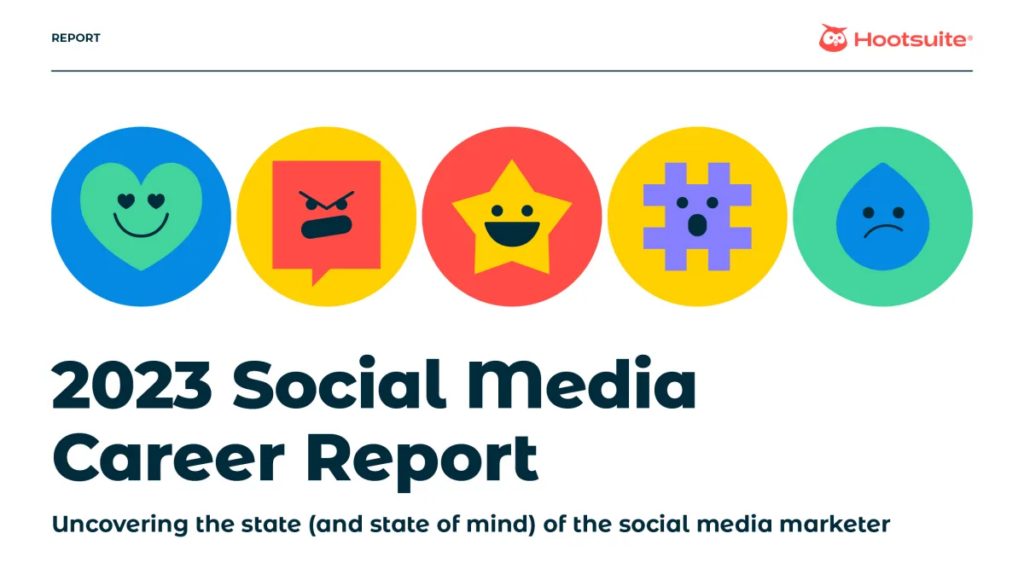Social media marketing drives growth; social media management keeps the engine running. In SaaS, these two functions often get blurred—but one drives demand, the other powers the operations behind it. Why does this distinction matter? Because social is no longer a side channel. 40% of B2B marketers say LinkedIn delivers the best leads, and 93% agree social is key for brand exposure.
If your team treats social like a monolith, you’re missing the chance to optimize both performance and operations. In this guide, I’ll break down the differences, and show you how to build a strategy that does both, brilliantly.
What Is Social Media Marketing?
Social media marketing is the art of leveraging social platforms to promote products or services, engage with the target audience, and ultimately drive business goals.
Social media marketing has a 100% higher lead-to-close rate than traditional outbound marketing tactics! That’s a stat we love to see. The objectives of social media marketing for SaaS companies can vary, ranging from lead generation and customer acquisition to fostering brand loyalty and advocacy. More on that below.
Key Platforms for Social Media Marketing
Choosing the right social media platforms is crucial for SaaS marketing success. How do you know which one to use? Like I mentioned above, LinkedIn is a goldmine for B2B SaaS companies. But there are different platforms that you can take advantage of.
X, formerly Twitter, allows for real-time engagement and updates, while Facebook and Instagram provide powerful visual storytelling opportunities.
Is TikTok necessary for your business? Well, is your target audience mostly on that platform? Understanding the strengths, algorithms, and demographics of each platform is essential so you can reach your potential customers and meet your marketing goals.
Examples of SaaS Social Media Marketing
Hubspot is a great example of a SaaS company simply talking to their customers, just to talk! It may not be about the product all the time, but it encourages engagement and community.

Equally brilliant, Adobe uses its own product to create quality social content to engage with their visually and artistically gifted community on Instagram.

Hootsuite consistently situates itself as an industry leader with their career and trend reports. They’ve stacked their website with value so they’re always in the top five of search results when looking for thought leadership on social media.

Zoom used the COVID-19 pandemic to launch a campaign to encourage new users to be creative with their virtual backgrounds, garnering more and more users by the day!

What is Social Media Management?
Social media management revolves around the day-to-day operations of handling social media accounts. This includes content scheduling, audience engagement, and monitoring social media channels through social listening for brand mentions. The primary objective of social media management is to maintain a consistent and positive online presence. Benefits of social media management include increased awareness, community building, and feedback loops.
Role in Customer Service
Beyond marketing, social media management is a crucial component of customer service for SaaS companies. Customers often turn to social media to seek assistance or voice concerns.
In fact, 90% of consumers will buy from brands they connect to on social media as they feel more loyal toward them! Effective social media community management ensures timely responses, turning potential issues into opportunities to showcase stellar customer service.
Tools and Software
To streamline social media content and management tasks, various free and paid tools are available in the market. Social media scheduling tools like Hootsuite, Buffer, and Sprout Social help with the optimization of content scheduling, monitoring, and analytics. Implementing these tools help SaaS businesses stay organized, save time, and make data-driven decisions.
With social media spending recently overtaking paid search as an advertising channel, growing 25% YoY and exceeding $137 billion, you’ll want to make sure your processes are as smooth as possible. Here are a few social tools and software we recommend:
Key Differences: Social Media Marketing Vs Social Media Management
Social media marketing is an outward-facing, strategic function whose primary objective is to drive brand awareness and generate leads. Social media management is operational. It’s what keeps your social presence organized, responsive, and reliable.
There is some overlap between the two functions: they may use the same platforms, and require deep audience knowledge. And in smaller SaaS teams, they’re often handled by the same person or agency.
But, here’s where they diverge:
| Social Media Marketing | Social Media Management |
| Campaign strategy | Post scheduling |
| Audience growth | Community moderation |
| Content creation & curation | Content publishing workflow |
| Paid media strategy | Social listening & reporting |
| Brand storytelling | Customer response coordination |
Goals and KPIs
While social media marketing campaigns are primarily focused on achieving overarching business goals, such as lead generation and brand awareness, social media management is more concerned with maintaining a consistent and positive online presence on the company’s active social media networks.
The key performance indicators (KPIs) for marketing may include conversion rates, click-through rates, and ROI. In contrast, social media management KPIs often involve response times, engagement rates, and sentiment analysis.
Required Skill Sets
Social media marketing requires a blend of creativity, strategic thinking, and data analysis skills. Marketers must be adept at crafting compelling content, understanding target audiences, and optimizing ad campaigns.
Social media management, on the other hand, demands excellent communication skills, customer service acumen, and the ability to navigate various social media profiles, and publishing content, effectively. You may also wish to brush up on some management tips to keep your team aligned.
Budget and Resource Allocation
The budget allocation for social media marketing often includes expenses related to paid social media ads, content creation, and analytics tools. In contrast, social media management may require investment in social media management tools and personnel dedicated to monitoring and responding to social media activity. Finding the right balance between these two allocations is crucial for a holistic social media strategy. You just don’t want to be part of the 8% of businesses that are completely without a social media strategy.
Social Media Management vs Social Media Marketing: Which Is Better for Your Business?
This isn’t really a case of one versus the other. In reality, social media management and social media marketing should work together as one unified strategy that helps you reach your goals. Here are some of the ways in which you can make both social media marketing and social media management work in tandem:
Aligning Objectives
To achieve optimal results, it's essential to align the objectives of social media marketing and management. Clear communication is key between teams, ensuring that both are working towards a unified marketing strategy. For example, if the marketing team is running a campaign to generate leads, the social media management team should be prepared to handle an increase in inquiries and engagement.
Creating a Unified Team
While distinct skill sets are required for social media marketing and management, creating a unified team can enhance overall efficiency. Encourage cross-training and collaboration between team members to foster a holistic understanding of both aspects. This not only promotes a shared vision but also ensures a seamless transition between marketing and management responsibilities.
Measuring Success
Measuring the success of a comprehensive social media strategy involves evaluating both marketing and management metrics. There are different social media management costs associated with different platforms and strategies. Utilize analytics tools and dashboards, like top rated Hootsuite or Sprout Social, to track marketing KPIs like conversion rates and engagement metrics, while also monitoring social media management KPIs such as response times and sentiment analysis.
Some metrics are worth reviewing daily, such as the performance of individual posts and content types. Others might make more sense to check on a monthly or bi-weekly basis, like cost per acquisition or follower count.
Strategic Planning for Social Media
A strong social media marketing strategy is about how every post ladders up to larger business goals. Whether you're working with an in-house marketing manager or a marketing agency, strategic planning means aligning content calendars, channel selection, audience targeting, and campaign messaging with company objectives.
To create an impactful social media presence, you need to know:
- Who you're trying to reach
- What platforms they trust
- What content format converts
- How social contributes to generating leads, not just impressions

According to Statista, 65% of marketers say they use social media for lead generation. That means strategy can’t be an afterthought. It must be integrated into every quarterly plan, not just lived in the social tool queue.
Striking the right balance in your social media efforts means knowing when to push, when to listen, and when to step back. Remember: a strong social media presence is about consistency, not just volume.
Community Management through Social Media
Community management is the connective tissue between your brand’s online presence and the people engaging with it. That includes replying to comments, moderating discussions, responding to customer issues, and proactively engaging users—not just when you want them to click, but when you want them to care.
For SaaS companies especially, this is critical. Support, loyalty, and brand voice are forged in everyday interactions. A smart marketing manager knows: without community engagement, your brand becomes just another broadcaster.
According to a study by HubSpot, 86% of marketers in 2024 have identified community building as being crucial to the success of their social media strategy. If you’re not listening and replying, your competitor is.
Social Media Marketing Strategies
A well performing social media marketing strategy combines creative storytelling with data-backed targeting. That includes:
- A clear goal for every campaign (e.g. generating leads, launching features, increasing retention)
- Predefined success metrics (CTR, CPL, engagement rate, trial signups)
- A cohesive brand voice across channels
- Paid and organic integration (including social media advertising)
Partnering with a marketing agency can fast-track this by bringing external expertise, but in-house teams should build repeatable playbooks too.
Social Media Marketing Roles
Social media roles today require strategic thinking, a keen understanding of data, and brand stewardship. Whether you’re hiring for your team, or you're a marketing manager looking to grow, it's important to understand the evolving landscape of social media careers. Key paths include:
- Social Media Manager → Brand Director
- Content Creator → Campaign Strategist
- Community Manager → Customer Experience Lead
- Paid Social Specialist → Performance Marketing Lead
And with the rise of AI-assisted tools and platform specialization (think LinkedIn vs TikTok), there’s more room than ever for specialization. Social media roles have seen a 6% growth year-over-year since 2023.
Social Media Marketing vs Digital Marketing
Digital marketing is the broader umbrella: SEO, PPC, email, display ads, and more. Social media marketing sits inside that scope, focused specifically on channels like LinkedIn, X (Twitter), Instagram, and TikTok to drive real-time engagement and community-driven growth.
For B2B SaaS, especially on LinkedIn, social media advertising, is often the highest-performing channel for generating leads, with 44% of B2B marketers calling it the most effective (Statista).
But the key is integration. Social shouldn’t live in a silo. It should amplify content, retarget users, and connect with every stage of your digital funnel.
Additional Resources
Want to dig deeper into social media marketing vs social media management? Here's what to check out next:
How to Measure Social Media ROI
Best Social Listening Tools in 2025
Social Media Growth Strategies That Work
It's Time To Go Create Your Social Media Strategy
Social media is an indispensable tool. Not only for customer acquisition and brand awareness, but overall business success. Understanding the distinctions between social media marketing and social media management is crucial for devising a comprehensive strategy that addresses both the promotional and operational aspects of these platforms.
By aligning objectives, creating a unified team, and measuring success across both marketing and management efforts, SaaS companies can leverage the full potential of social media. Remember, it's not a question of choosing between social media marketing and management but finding the right blend that suits the unique needs and goals of your business!
Still want more? Subscribe here for insights straight to your inbox!


